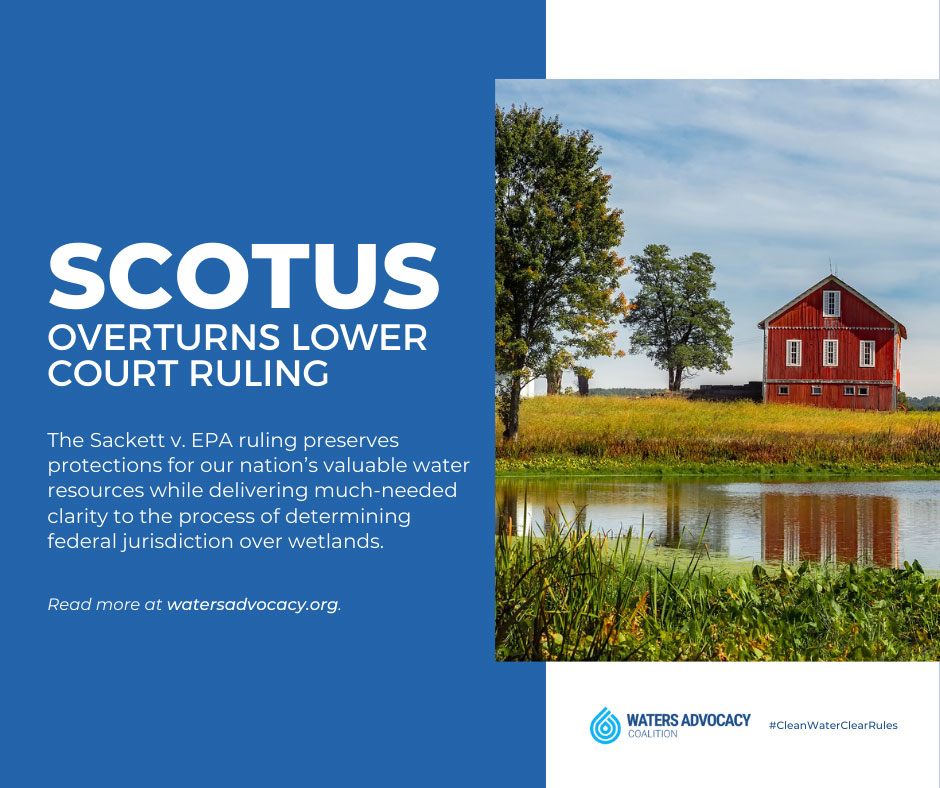 #CleanWaterClearRules
#CleanWaterClearRules
May 25, 2023
WASHINGTON, DC – Earlier today, the Supreme Court of the United States issued its long-awaited opinion in the case Sackett v. EPA, ruling in favor of the Sacketts – a significant victory for the agriculture and broader business industries. All nine Justices affirmed the decision through various concurring opinions.
In this case, the Sacketts purchased property near Priest Lake, Idaho, and began backfilling the lot with dirt to prepare for building a home. The Environmental Protection Agency (EPA) informed the Sacketts that their property contained wetlands and that their backfilling violated the Clean Water Act (CWA), which prohibits discharging pollutants into the waters of the United States (WOTUS). The EPA ordered the Sacketts to restore the site, threatening penalties of more than $40,000 per day. The EPA classified the wetlands on the Sacketts’ lot as WOTUS because they were near a ditch that fed into a creek, which fed into Priest Lake, a navigable, intrastate lake.
The Sacketts sued, alleging that their property was not WOTUS. The District Court entered summary judgment for the EPA. The Ninth Circuit affirmed, holding that the CWA covers wetlands with an ecologically significant nexus to traditional navigable waters and that the Sacketts’ wetlands satisfy that standard.
On January 18, 2023, EPA and the Army Corps of Engineers published a final rule revising the definition of WOTUS in the Federal Register. USA Rice commented in opposition to this rule since it maintained the use of the significant nexus test and vastly expanded the waters that would be covered under WOTUS. The rule went into effect on March 20, 2023. However, the final rule is not operative in more than half the country due to court ordered injunctions.
The case before the Supreme Court ultimately challenged the use of the significant nexus test whereby EPA determines that a wetland is within the meaning of WOTUS when the wetland, either alone or in combination with similarly situated lands in the region, significantly affects the chemical, physical, or biological integrity of those waters. Under this policy, the agencies assert jurisdiction over “adjacent” wetlands even when there is no direct connection to traditional navigable waters. By the EPA’s own admission, nearly all waters and wetlands are potentially susceptible to regulation under this test, putting a staggering array of rice growers and other landowners at risk of criminal prosecution for such mundane activities as moving dirt.
The Supreme Court has now unanimously rejected EPA’s use of the significant nexus test finding the theory to be “particularly implausible.” All nine justices agreed that EPA’s meaning of WOTUS is so “broad and unqualified” that, if viewed in isolation, it would extend to all water in the United States.
In a majority opinion affirmed by Justices Alito, Roberts, Thomas, Gorsuch, and Barrett, the court found that the meaning of “waters” is more limited than the EPA believes and asserts that WOTUS refers only to “geographic[al] features that are described in ordinary parlance as ‘streams, oceans, rivers, and lakes’” and to adjacent wetlands that are indistinguishable from those bodies of water due to a continuous surface connection. The remaining justices (Kavanaugh, Kagan, Sotomayor, and Jackson) likewise rejected the use of the significant nexus test, but disagree on the new test for adjacency requiring a continuous surface connection.
“While it could be a while before we understand the full ramifications of the Supreme Court’s decision, USA Rice applauds the Supreme Court’s Sackett v. EPA decision that upends the Biden Administration’s WOTUS rule and pushes EPA back to the drawing board to draft clear and concise water rules for rice farmers and our industry,” said David Petter, an Arkansas rice farmer and chair of the USA Rice Regulatory Affairs and Food Safety Committee. “Rice farmers look forward to a rule that protects clean water, while also respecting private property rights. Stay tuned as we learn more about the full scope of the decision, but this is a great day for U.S. agriculture!”